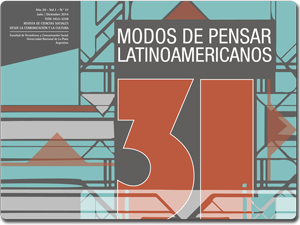New identities populares / New latin-american forms of hegemony
Keywords:
indianismo, emancipation, Latin America, populismAbstract
The present article analyzes from a historical and political look two Latin-American experiences of populism: from Álvaro García Linera’s perspectives, and his review of the indigenismo like ideology emancipatoria in Bolivia, and of Ernesto Laclau, who analyzes the kirchnerismo as expression of new popular identities in the Argentina. Hereby, it is sought to contribute to the vision of the intellectual ones on these movements that they present new in his ways of being constituted so much like in his relation by the democracy. Specially, are recognized ideas and own identities of the region, especially in contraposition with the Anglo-Saxon positions.Downloads
Downloads
Published
How to Cite
Issue
Section
License
The acceptance of an original by the journal implies the non-exclusive transfer of the patrimonial rights of the authors in favor of the publisher, who allows the reuse, after its edition (postprint), under a Creative Commons License Attribution-NonCommercial-ShareAlike 4.0 International.
According to these terms, the material can be shared (copy and redistribute in any medium or format) and adapted (remix, transform and create another work from the material), provided that a) the authorship and the original source of their publication (magazine and URL of the work) are cited, b) is not used for commercial purposes and c) the same terms of the license are maintained.
The assignment of non-exclusive rights implies that after postprint in Oficios Terrestres authors may publish their work in any language, media and format; in that case, it is requested that they signal that the material was originally published by this journal.
Assignment also entails the authors’ authorization for the work to be collected by SEDICI, the institutional repository of the Universidad Nacional de La Plata, and for it to be indexed in the databases that the publisher thinks appropriate for enhancing the visibility of the published work and its authors.
In addition, the journal encourages authors to submit their works to other institutional and thematic repositories after their publication in Oficios Terrestres, under the assumption that offering society unrestricted access to scientific and academic production contributes to a greater exchange in global knowledge.







_(Custom)11.jpg)




.png)






















